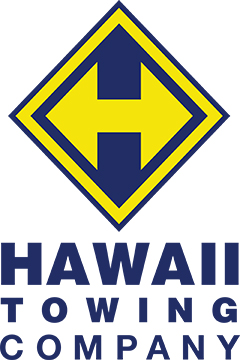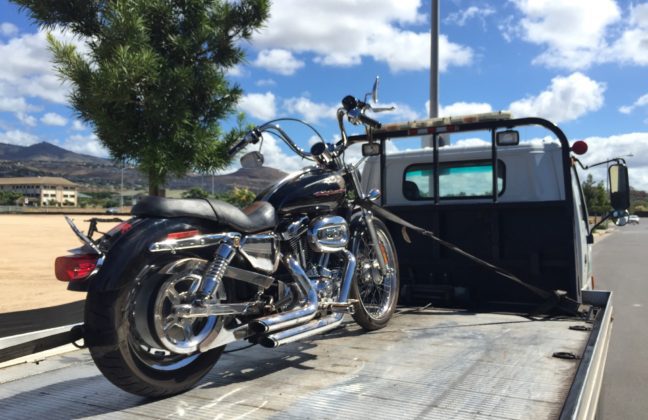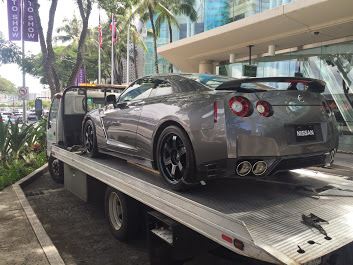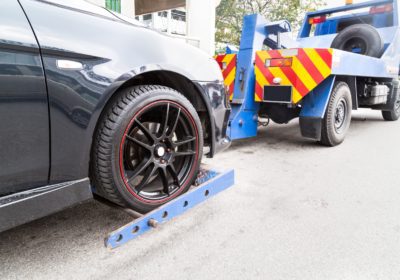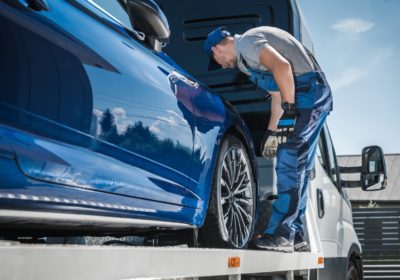Handle Challenges Like a Pro
Unlock the mastery of motorcycle towing with expert techniques tailored for tackling diverse challenges seamlessly. From navigating tight urban spaces to conquering rugged terrains, elevate your skills to pro level proficiency. Explore nuanced strategies to ensure safety, efficiency, and precision in every tow. With Hawaii Towing Company Inc, delve into the intricacies of motorcycle towing, mastering the art of handling various scenarios with finesse. Gain the confidence and expertise needed to tackle any towing task with precision and ease.
Understanding Motorcycle Towing: A Crucial Skill for Riders
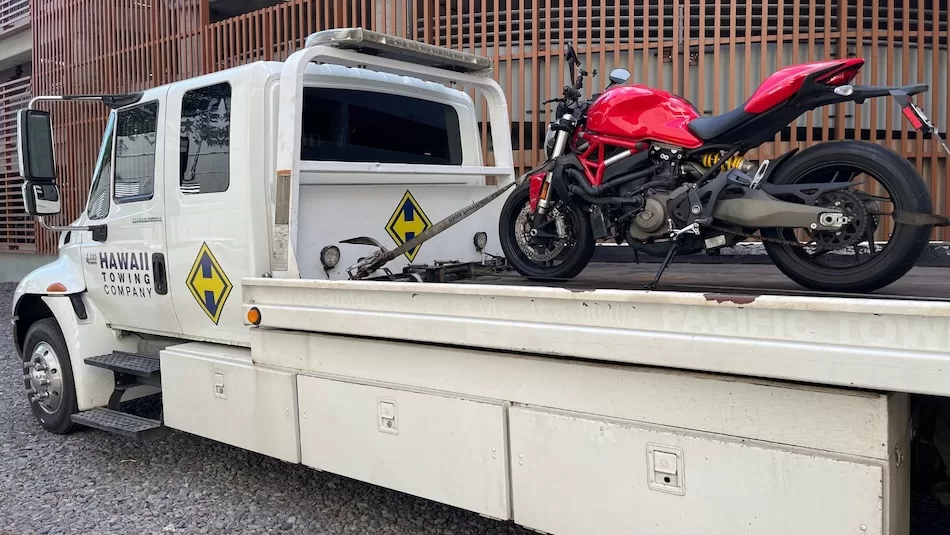
Mastering motorcycle towing techniques is crucial for any rider, regardless of experience level. Whether you’re embarking on a solo adventure or riding with friends, unforeseen circumstances can arise, leaving you stranded on the side of the road. Knowing how to safely tow your motorcycle can mean the difference between a minor inconvenience and a major setback. From mechanical failures to accidents, there are numerous scenarios where having towing knowledge can prove invaluable. By understanding the fundamentals of motorcycle towing, riders can approach these situations with confidence and efficiency.
Learning to tow a motorcycle involves more than just hooking it up to a vehicle and hitting the road. It requires knowledge of proper equipment, loading and unloading techniques, and safety precautions. Riders must also be prepared to navigate challenging terrain and handle emergency situations that may arise during towing. With the right skills and mindset, mastering motorcycle towing can empower riders to overcome obstacles and get back on the road with minimal disruption to their journey.
The Importance of Proper Equipment in Motorcycle Towing
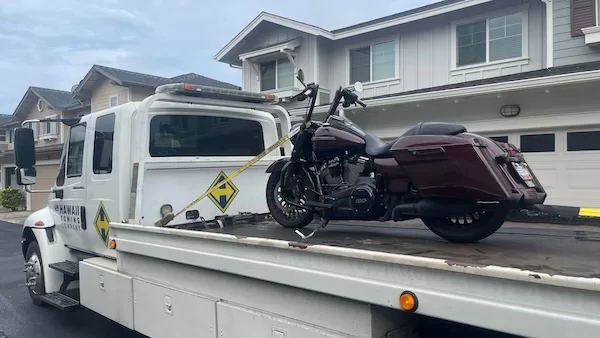
When it comes to towing a motorcycle, having the right equipment is essential. From tow straps and hitch mounts to trailers and trucks, there are various tools available to help riders transport their bikes safely and securely. Investing in high-quality equipment not only ensures a smoother towing experience but also minimizes the risk of damage to the motorcycle. It’s important to choose equipment that is suitable for the size and weight of your bike, as well as the type of towing you’ll be doing. By selecting reliable gear and maintaining it properly, riders can enjoy peace of mind knowing that their motorcycle is in good hands.
In addition to choosing the right equipment, proper usage is also crucial in motorcycle towing. This includes securely fastening the bike to the towing vehicle, distributing weight evenly, and following all safety guidelines. Neglecting to use equipment correctly can lead to accidents, injuries, or damage to the motorcycle. Before towing, it’s essential to inspect all equipment for signs of wear or damage and make any necessary repairs or replacements. By taking the time to invest in and maintain proper equipment, riders can ensure a safe and successful towing experience, whether they’re traveling across town or across the country.
Preparing Your Motorcycle for Towing: Dos and Don’ts
Preparing your motorcycle for towing is a crucial step in ensuring a smooth and safe journey. Before hitting the road, there are several key dos and don’ts to keep in mind. Do secure any loose parts, such as mirrors or saddlebags, to prevent them from becoming detached during towing. Disconnecting the battery is also recommended to avoid draining it while the bike is being towed. Additionally, ensuring that the motorcycle is in neutral gear and the parking brake is disengaged will prevent unnecessary strain on the towing vehicle and make loading and unloading easier. On the other hand, don’t overlook basic maintenance tasks like checking tire pressure and fluid levels before towing. Neglecting these simple steps could lead to further issues down the road and potentially compromise the safety of your motorcycle.
When it comes to preparing your motorcycle for towing, attention to detail is key. Taking the time to properly secure loose parts and disconnect the battery can prevent damage to your bike and ensure a smoother towing experience. By following these dos and don’ts, riders can minimize the risk of accidents or breakdowns during towing and get back on the road with confidence.
Safe Loading and Unloading Techniques for Motorcycle Towing
Loading and unloading a motorcycle onto a trailer or tow truck requires precision and caution. Before attempting to load your bike, make sure that the ramp is securely in place and can support the weight of both the motorcycle and the rider. Position the motorcycle in line with the ramp and use caution when applying throttle to avoid sudden movements. Once the bike is loaded, securely fasten it to the trailer or tow vehicle using high-quality tie-down straps.
Distribute the straps evenly to ensure that the motorcycle remains stable during transport. When unloading, reverse the process, making sure to remove all straps and accessories before carefully guiding the bike down the ramp. By mastering these loading and unloading techniques, riders can ensure that their motorcycle remains secure and undamaged throughout the towing process.
Handling Emergency Situations During Motorcycle Towing
Despite careful planning, emergencies can still occur during motorcycle towing. Being prepared to handle these situations can make all the difference in ensuring a safe outcome. One common emergency is a sudden shift in weight, which can occur if the motorcycle is not properly secured or if the towing vehicle makes sudden movements. In this situation, it’s important to remain calm and avoid sudden braking or acceleration, which can exacerbate the problem. Instead, gradually reduce speed and pull over to a safe location to reassess the situation and make any necessary adjustments to the towing setup.
Another common emergency during motorcycle towing is a loose strap or tie-down. If a strap becomes loose or detached while on the road, it’s crucial to pull over immediately and secure the motorcycle before continuing. Attempting to continue towing with a loose strap can result in the bike shifting or falling off the trailer, causing damage or posing a danger to other motorists. By staying alert and knowing how to respond to emergencies, riders can ensure a safer towing experience and minimize the risk of accidents or damage to their motorcycle.
Navigating Challenging Terrain: Tips for Off-Road Motorcycle Towing
Off-road towing presents its own set of challenges, from navigating uneven terrain to overcoming obstacles like rocks and tree roots. In these situations, knowing how to adapt your towing techniques is essential for a successful outcome. One useful tip is to use a winch to help navigate steep inclines or rough terrain. By attaching the winch to a sturdy anchor point and slowly winching the motorcycle up or down, riders can safely traverse difficult terrain without risking damage to the bike or towing vehicle.
Additionally, employing a buddy system can provide extra support and assistance when navigating challenging off-road conditions. Having a second person to help guide the motorcycle or provide additional muscle power can make towing in difficult terrain much easier and safer. By following these tips and techniques, riders can confidently tackle off-road towing scenarios and reach their destination without incident.
Understanding Legal Considerations in Motorcycle Towing
Before towing a motorcycle, it’s crucial to understand the legal considerations and regulations that may apply in your area. This includes familiarizing yourself with weight limits, licensing requirements, and any specific towing restrictions. For example, some states may require additional licensing or permits for towing certain types of vehicles, while others may have specific rules regarding towing equipment and techniques.
Ignoring these legal considerations can result in fines, penalties, or even legal action, so it’s essential to do your research beforehand. Additionally, staying informed about local laws and regulations ensures that you’re operating within the bounds of the law and reduces the risk of encountering legal issues while towing your motorcycle.
DIY vs. Professional Motorcycle Towing: Making the Right Choice
When faced with the need to tow a motorcycle, riders often have to decide between handling the task themselves or enlisting the help of professional towing services. Both options have their advantages and drawbacks, so it’s important to weigh them carefully before making a decision. DIY towing can be cost-effective and convenient, especially for riders who have experience with towing equipment and techniques. It allows you to have more control over the process and can save time by avoiding the need to wait for a towing company to arrive. However, DIY towing also requires access to the proper equipment and expertise, and inexperienced riders may risk causing damage to their motorcycle or endangering themselves and others on the road.
On the other hand, professional motorcycle towing services offer expertise, experience, and specialized equipment that can make the towing process smoother and safer. They are equipped to handle a wide range of towing scenarios, from roadside breakdowns to long-distance transport. While professional towing services may come at a higher cost, they provide peace of mind knowing that your motorcycle is in the hands of trained professionals who prioritize safety and efficiency. Ultimately, the choice between DIY and professional towing depends on factors such as your level of experience, the complexity of the towing job, and your budget. By carefully considering these factors, riders can make the right choice for their specific situation and ensure a successful towing experience.
Conclusion
Mastering motorcycle towing techniques is essential for handling challenges like a pro. Whether navigating tight urban streets or rugged terrains, Hawaii Towing Company Inc. recognizes the importance of expertise in safely transporting motorcycles. Through meticulous training and dedication, mastering these techniques ensures swift and secure towing operations. From properly securing the bike to navigating tricky road conditions, attention to detail is paramount. By honing these skills, professionals can tackle any towing task with confidence and precision, ensuring the safety of both the motorcycle and surrounding traffic. With mastery comes efficiency, reliability, and the ability to handle challenges seamlessly, distinguishing professionals in the towing industry.
